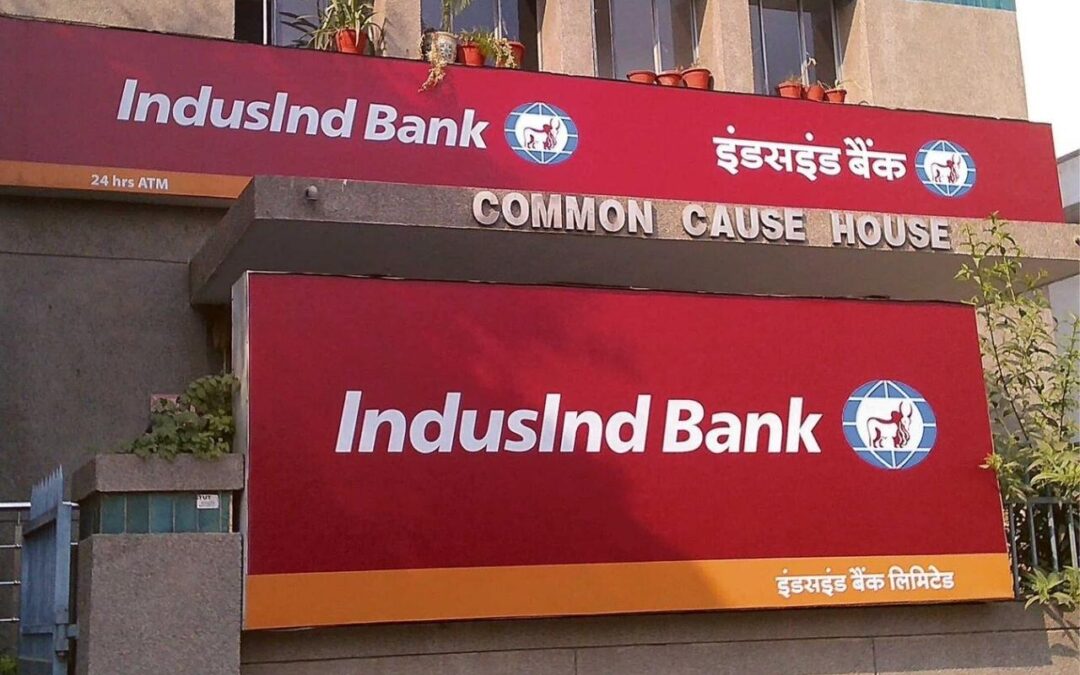Synopsis:
Indusind Bank reacted negatively after posting a loss of Rs 437 crore in Q2 FY26. Its asset quality also worsened during this period, causing a strain on the company’s balance sheet. Leading brokerages also expressed their disappointment over its performance.
The shares of India’s fifth-largest private bank are in focus after reporting a disappointing financial performance. In this article, we will dive more into the details of its performance in the second quarter of this financial year.
With a market capitalization of Rs 58,816 crore, the shares of IndusInd Bank Ltd made a day low of Rs 725.90 per share, down by 3.4 percent from its previous day closing price of Rs 751 per share. Over the past five years, the stock has delivered a poor return of 26 percent, underperforming NIFTY 50’s return of 117 percent.
Q2 Highlights
IndusInd Bank has reported a Net Interest Income of Rs 4,409 crore in Q2 FY26, a decline of 18 percent as compared to Rs 5,347 crore in Q2 FY25. Additionally, on a quarter-on-quarter basis, it declined by 5 percent from Rs 4,640 crore.
Regarding its profitability, it reported a net loss of Rs 437 crore in Q2 FY26 as compared to a profit of Rs 1,331 crore in Q2 FY25. Additionally, on a quarter-on-quarter basis, it reported a sharp plunge from a profit of Rs 604 crore.
Coming to different key financial metrics, its Net Interest Margin (NIM) declined by 76 bps to 3.32 percent in Q2 FY26 as compared to 4.08 percent in Q2 FY25. Also, its Cost to Income ratio grew significantly to 66.22 percent as compared to 52.21 percent in Q2 FY25.
Asset quality also worsened during the same period; GNPA increased by 149 bps to 3.60 percent as compared to 2.11 percent in Q2 FY25. NNPA stands at 1.04 percent as compared to 0.64 percent in Q2 FY25.
It has a total loan book of Rs 3,25,881 crore, which declined by 9 percent YoY and 2 percent QoQ, where 60 percent of its loan book is exposed to consumer banking and the remaining 40 percent to corporate & commercial banking.
The bank deposits have declined by 6 percent to Rs 3,89,600 crore in Q2 FY26 as against Rs 4,12,397 crore in Q2 FY25. CASA deposits were Rs 1,19,771 crore, with current account deposits at Rs 31,916 crore and Savings Account deposits at Rs 87,854 crore. CASA deposits accounted for 35 percent of the total deposits as of September 30, 2025.
Also read: 20% Upper Circuit: Jewellery stock skyrockets after reporting 203% YoY increase in net profit
Analyst Comments
Leading brokerage house, Morgan Stanley, has maintained an Equal-weight rating and assigned a target price of Rs 785 per share, signaling an upside of 4.5 percent from its previous day’s closing price of Rs 751 per share.
The brokerage mentioned that the increased provisions have boosted the bank’s safety margin; however, the increase in non-performing loans in the microfinance segment is still worrying. The bank is forecasted to profit again gradually by the financial year 2027, although net income has been reduced due to lower fee income and asset quality pressure.
On the other hand, Elara Capital has given a Sell rating and assigned a target price of Rs 720 per share, signaling a downside of 4 percent from its previous day’s closing price of Rs 751 per share.
The brokerage cited that the bank faced risks due to the unclear quality of assets. According to the report, IndusInd Bank has already exhausted its whole safety cushion; thus, there is very little space for errors. The emphasis is on the management team and their approach to the bank’s strategy.
In summary, IndusInd Bank’s Q2 results were disappointing, as it recorded a loss of Rs 437 crore, and deterioration in asset quality depressed investor sentiment. Although brokerages are still cautious because of the increase in non-performing loans and the pressure on margins, the bank’s revival will depend on the management’s direction of the strategy and the improvement in asset quality. Shareholders might be better off waiting for further insight into the bank’s recovery before making significant moves.
Written by Satyajeet Mukherjee
Disclaimer

The views and investment tips expressed by investment experts/broking houses/rating agencies on tradebrains.in are their own, and not that of the website or its management. Investing in equities poses a risk of financial losses. Investors must therefore exercise due caution while investing or trading in stocks. Trade Brains Technologies Private Limited or the author are not liable for any losses caused as a result of the decision based on this article. Please consult your investment advisor before investing.


